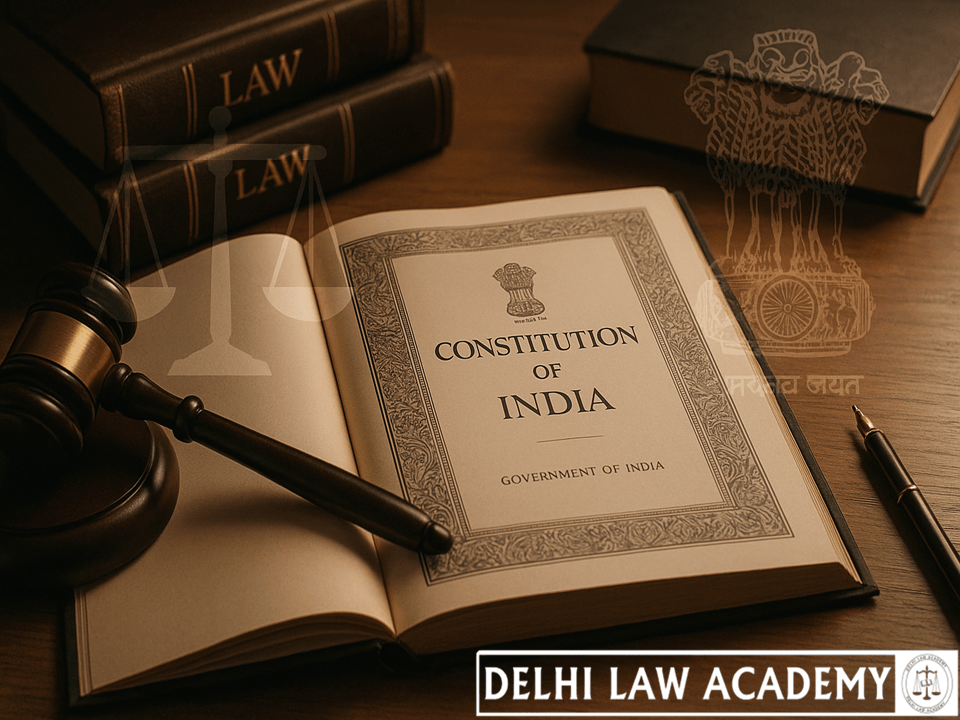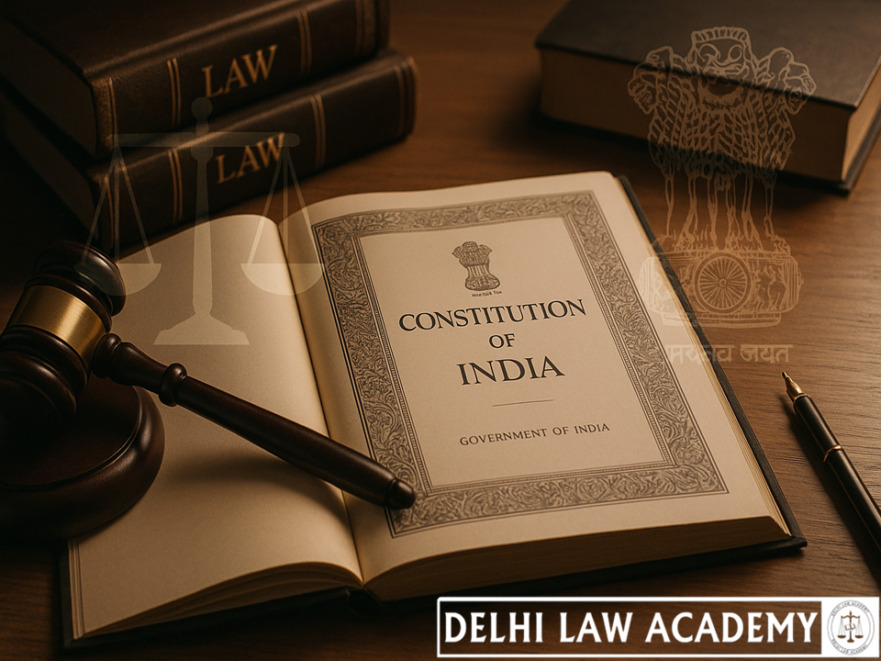
⚖️ Union Judiciary – Article 124 & 99th Constitutional Amendment
Delhi Law Academy Jaipur | Notes for RJS, DJS & PCS(J) Judiciary Aspirants
📘 Articles 124 of the Constitution of India
99th Constitutional Amendment, 2014
Delhi Law Academy Jaipur presents below for aspirants of RJS, DJS, PCS(J) and other Judicial Services throughout India a simplified Note on the Constitutional provisions relating to constitution and functioning of UNION JUDICIARY.
🧑⚖️ Appointment of Judges
- The opinion of the Chief Justice of India which has primacy in the matter of recommendations for appointment to the Supreme Court has to be formed in consultation with a collegium of Judges.
- Having regard to the terms of Article 124(2), the collegium should consist of the Chief Justice of India and the four seniormost puisne Judges of the Supreme Court.
🏛️ Supreme Court — Article 124(1)
- Supreme Court of India consists of Chief Justice of India and not more than 7 other judges.
- Parliament may by law prescribe a larger number of judges.
Explanatory Notes from DLA:
- The number of other judges was increased to 25 in 1986 and 30 in 2008 by amendments in the Supreme Court (Number of Judges) Act 1956.
- The Supreme Court of India came into being on 28 January 1950, replacing both the Federal Court of India and the Judicial Committee of the Privy Council.
- The first Chief Justice of India was Shri H.J. Kania.
⚖️ Appointment of Judges — Article 124(2)
Original Provision
- A judge of Supreme Court shall be appointed by President after consultation with such SC and HC judges as President deems necessary.
- For appointment of a judge other than Chief Justice, Chief Justice of India shall always be consulted.
Judicial Interpretation of Article 124(2):
- First Judges Case: P. Gupta v. President of India (1981)
- Second Judges Case: Supreme Court Advocates-on-Record Association v. Union of India (1993)
- Third Judges Case: Re Special Reference 1 of 1998
📜 Appointment to the Supreme Court
- The opinion of the Chief Justice of India which has primacy in appointments is to be formed in consultation with a collegium of Judges.
- The collegium should consist of the Chief Justice of India and the four seniormost puisne Judges of the Supreme Court.
- In making decisions, the collegium considers views from the seniormost Judge from the same High Court as the nominee, and other Judges or Chief Justices as appropriate.
- Recommendations should ideally be by consensus; if a majority of the collegium is against a candidate, the appointment does not proceed.
- If even two Judges of the collegium express strong adverse views, the Chief Justice would not press for such appointment.
- Outstanding merit takes precedence over seniority.
📘 99th Constitutional Amendment, 2014
- Amended Articles 124, 217 and 222
- Added Articles 124A, 124B and 124C
- Established the National Judicial Appointments Commission (NJAC) for appointment and transfer of Judges of the Supreme Court and High Courts.
🧾 Article 124A — Composition of NJAC
- Chief Justice of India — Chairperson (ex officio)
- Two senior-most Judges of the Supreme Court next to the CJI — Members (ex officio)
- Union Minister in charge of Law and Justice — Member (ex officio)
- Two eminent persons nominated as Members
🪙 Appointments after the 99th Amendment
- After the amendment, Judges of the Supreme Court are appointed by the President on recommendation of the National Judicial Appointments Commission.
📚 For more Constitution & Polity Notes, visit
Delhi Law Academy Jaipur
📘 Stay Ahead with Delhi Law Academy!
Get access to free monthly current affairs, read our insightful blogs,
and explore free study resources prepared by experts at DLA Jaipur. 🚀
❓ Frequently Asked Questions on Union Judiciary (Article 124 & NJAC)
⚖️ What is Article 124 of the Indian Constitution about?+
Article 124 deals with the establishment and composition of the Supreme Court of India. It specifies that the Court shall consist of a Chief Justice of India and other judges as prescribed by Parliament by law. It also lays down provisions for their appointment, tenure, and removal.
🏛️ How are judges of the Supreme Court appointed under Article 124(2)?+
Under Article 124(2), judges of the Supreme Court are appointed by the President after consulting the Chief Justice of India and such judges of the Supreme and High Courts as the President may deem necessary. Judicial interpretation later evolved this into the Collegium System, giving primacy to the opinion of the Chief Justice of India and senior judges.
👩⚖️ What is the Collegium System and how does it work?+
The Collegium System, evolved from the Second and Third Judges Cases, comprises the Chief Justice of India and the four senior-most Supreme Court judges. It collectively recommends appointments and transfers of judges to the higher judiciary, ensuring judicial independence from executive interference.
📜 What was the 99th Constitutional Amendment Act, 2014?+
The 99th Constitutional Amendment introduced Articles 124A, 124B, and 124C to establish the National Judicial Appointments Commission (NJAC). It aimed to replace the Collegium System by giving the executive and eminent persons a role in appointing judges. However, it was struck down by the Supreme Court in 2015 as unconstitutional for violating judicial independence.
⚙️ What is the composition of the National Judicial Appointments Commission (NJAC)?+
The NJAC comprised six members: the Chief Justice of India (Chairperson), two senior-most Supreme Court judges, the Union Law Minister, and two eminent persons nominated jointly by the Prime Minister, Chief Justice of India, and Leader of Opposition in Lok Sabha.
📚 Why was the NJAC struck down by the Supreme Court?+
The NJAC was struck down in the 2015 case *Supreme Court Advocates-on-Record Association v. Union of India* because it violated the principle of judicial independence, a part of the Constitution’s basic structure. The Court reinstated the Collegium System for judicial appointments.
Contact us
📍 Delhi Law Academy – Jaipur Branch
6C, Tower 2, Coaching Hub, Pratap Nagar, Jaipur – 302033
📞 Phone:
+91 9911916552
+91 8447285606
✉️ Email:
contactus@delhilawacademy.com

